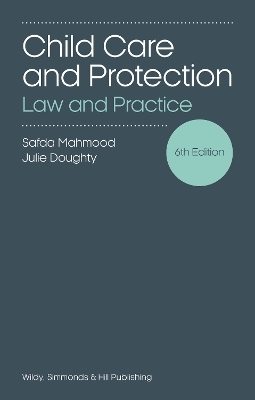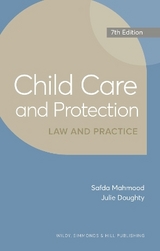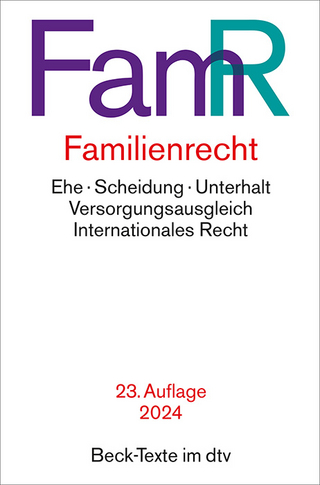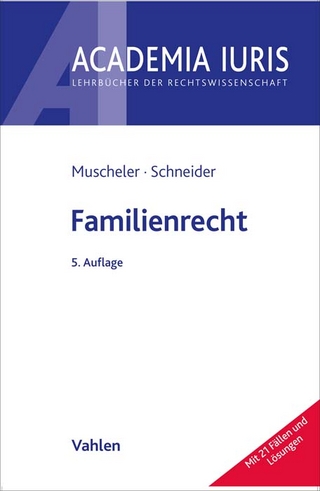
Child Care and Protection: Law and Practice
Wildy, Simmonds and Hill Publishing (Verlag)
978-0-85490-268-2 (ISBN)
- Titel erscheint in neuer Auflage
- Artikel merken
Child Care and Protection: Law and Practice provides a practical and concise guide to the areas surrounding the Children Act 1989 and subsequent child protection legislation, guidance and case law. In addition to explaining the general principles of the law relating to child care and protection, the authors provide valuable insights into assessments, care planning, expert evidence, taking instructions, case preparation and courtroom skills.
Extensively updated, the sixth edition looks at all significant developments since the introduction of the Single Family Court in 2014, including the new procedures on control of expert evidence, duration of care proceedings, changes to children’s care plans, as well as the introduction of the Revised Practice Direction 12A (Care and Supervision Proceedings and other Part 4 Proceedings: Guide to Case Management), introduction of ‘child arrangements orders’, the Child Arrangements Programme (PD 12(B), with accompanying new forms and documents, and the Revised PD12J – Domestic Abuse and Child Arrangements.
Safda Mahmood has extensive experience in family law private practice and local government and currently practises as a solicitor, manager, and team leader in advocacy with Coventry City Council, Legal Services Department. He also runs training courses including Professional Development training for, amongst others, members of the Law Society Children Law Accredited Scheme, as well as various professional course providers. Julie Doughty has practice experience as a former solicitor and guardian ad litem panel manager, and currently she is a lecturer in law at Cardiff University. Julie writes widely in journals on child law topics and is a trustee of The Transparency Project and Family Mediation Cymru.
Preface
Acknowledgements
List of Abbreviations
List of Figures and Tables
1GLOSSARY AND LEGISLATIVE FRAMEWORK
1.1Glossary of basic definitions
1.2Orders available under the Children Act 1989
1.3Introduction to the Children Act 1989
1.4Changes to the Children Act 1989 introduced with the new Family Court
2PRINCIPLES UNDERLYING THE CHILDREN ACT 1989
2.1Paramountcy of the welfare of the child
2.2Delay is deemed prejudicial to child’s interests (the impact of the Public Law Outline)
2.3No order unless necessary in the interests of the child
3PARENTAL RESPONSIBILITY
3.1Definition, powers and duties of parental responsibility
3.2Legal position of child’s birth mother
3.3Legal position of child’s father
3.4Acquisition and loss of parental responsibility by child’s birth father
3.5Acquisition of parental responsibility by others
4EVERY CHILD MATTERS: CHILD PROTECTION PROCEDURES IN HEALTH AND SOCIAL WORK
4.1Safeguarding Partners, Child Safeguarding Practice Review and Child Death Review Partners
4.2Hierarchy within social services departments
4.3Referral procedures and preliminary investigations
4.4Child protection conferences
4.5Assessment of risk
4.6Child protection plan
4.7Child and Family Court Advisory Support Service
4.8Local authority duty to promote welfare of children in its area
5EMERGENCY PROTECTION ORDERS
5.1Effects of order
5.2Duration
5.3Grounds for application
5.4Practice and procedure
5.5Contact, accommodation and the rights of the child
5.6Variation and discharge
5.7Exclusion requirement under emergency protection order
5.8How do ‘without notice’ orders and Article 6 of the ECHR fit together?
5.9Emergency applications and new born children
6CHILD ASSESSMENT ORDERS
6.1Effects of order
6.2Grounds for application
6.3Practice and procedure
6.4Contact, accommodation and the rights of the child
6.5Appeals, variation and discharge
7CARE AND SUPERVISION PROCEEDINGS
7.1Care order – definitions
7.2Grounds for application for a care or supervision order
7.3Significant harm
7.4Practice and procedure
7.5Interim orders
7.6Effects of care order
7.7Public Law Outline – principles, ‘split hearings’, issues resolution, interim and final hearings
7.8Assessments and care planning
7.9Effects of supervision order
7.10Removal of child from care
7.11Variation, discharge and appeals
7.12Effects of the Human Rights Act 1998 on care and supervision proceedings
8SECURE ACCOMMODATION
8.1Restricting liberty with a secure accommodation order
8.2How long can a child be kept in secure accommodation?
8.3Grounds for application
8.4Practice and procedure
8.5Role of the children’s guardian
8.6Contact
8.7Rights of the child
8.8Appeals and the Human Rights Act 1998
9EDUCATION SUPERVISION ORDERS
9.1Effects of an education supervision order
9.2Duration
9.3Grounds for application
9.4Practice and procedure
9.5Rights of the child
9.6Variation, discharge and appeals
10POLICE POWERS UNDER THE CHILDREN ACT 1989
10.1Police powers and responsibilities
10.2Contact with child
11INSTRUCTIONS AND CASE PREPARATION IN FAMILY PROCEEDINGS
11.1Action plan on receipt of instructions from an adult or local authority
11.2Interviewing clients
11.3Preparation of the case
11.4Burden of proof and standard of proof in child law cases
11.5Special evidence rules in child law cases
11.6Court procedure at the hearing
11.7Courtroom skills
12CHILDREN’S RIGHTS
12.1To accept or refuse medical treatment
12.2To accept or refuse medical or psychiatric assessment
12.3To make his or her own application to the court
12.4To request confidentiality and, in the event of disagreement with the children’s guardian, to instruct a solicitor separately
12.5Rights of a child in care
12.6UN Convention on the Rights of the Child
13OTHER ORDERS AVAILABLE TO THE COURT IN FAMILY PROCEEDINGS
13.1Orders in family proceedings
13.2Section 8 orders
13.3Contact (spending time with, or otherwise having contact with)
13.4Prohibited steps
13.5Residence (living with)
13.6Specific issue
13.7Supplementary provisions
13.8Practice and procedure in applications under section 8 of the Children Act 1989
13.9Family assistance order
13.10 Order to local authority to investigate under
section 37 of the Children Act 1989
13.11 Special guardianship
14COMMENCEMENT AND TRANSFER OF PROCEEDINGS
14.1General rules
14.2Applicants and allocation of family case
14.3Transfers
14.4Urgent applications
15WORKING WITH CHILDREN
15.1Appointment and role of the children’s guardian
15.2Conflict between children’s guardian and child
15.3Should I see my child client?
15.4Taking instructions and communicating with children
15.5Child development
15.6Understanding your child client – race, religion, culture and ethnicity
15.7After the case is over
15.8Judges seeing children in children law proceedings
16ASSESSMENT OF CHILDREN IN NEED AND CARE PLANNING
16.1Developments and materials
16.2Assessment Framework
16.3Care planning
16.4Adoption issues
17APPEALS AND ENFORCEMENT
17.1Appeals and judicial review
17.2Complaints procedures
17.3Enforcement
18EXPERT EVIDENCE
18.1What is an expert witness?
18.2Choosing and instructing expert witnesses
18.3Expert witness evidence
18.4Expert evidence in court
18.5Finances for expert evidence
18.6Finding the right expert
19SOURCES AND GUIDANCE
19.1Statutes and bills
19.2Statutory instruments
19.3Conventions, protocols and regulations
19.4President’s guidance and practice guidance
19.5Government and Law Society publications
19.6Practice directions
19.7Reading and reference list
20IMPROVING LAW, SKILLS AND PRACTICE
20.1Professional and interdisciplinary associations
20.2The Law Society’s Children Law Accreditation
20.3Sources of useful information and contacts for children and families, and those who work with them
Index
| Erscheinungsdatum | 08.08.2019 |
|---|---|
| Verlagsort | London |
| Sprache | englisch |
| Maße | 138 x 216 mm |
| Gewicht | 388 g |
| Themenwelt | Recht / Steuern ► EU / Internationales Recht |
| Recht / Steuern ► Privatrecht / Bürgerliches Recht ► Familienrecht | |
| ISBN-10 | 0-85490-268-6 / 0854902686 |
| ISBN-13 | 978-0-85490-268-2 / 9780854902682 |
| Zustand | Neuware |
| Informationen gemäß Produktsicherheitsverordnung (GPSR) | |
| Haben Sie eine Frage zum Produkt? |
aus dem Bereich



